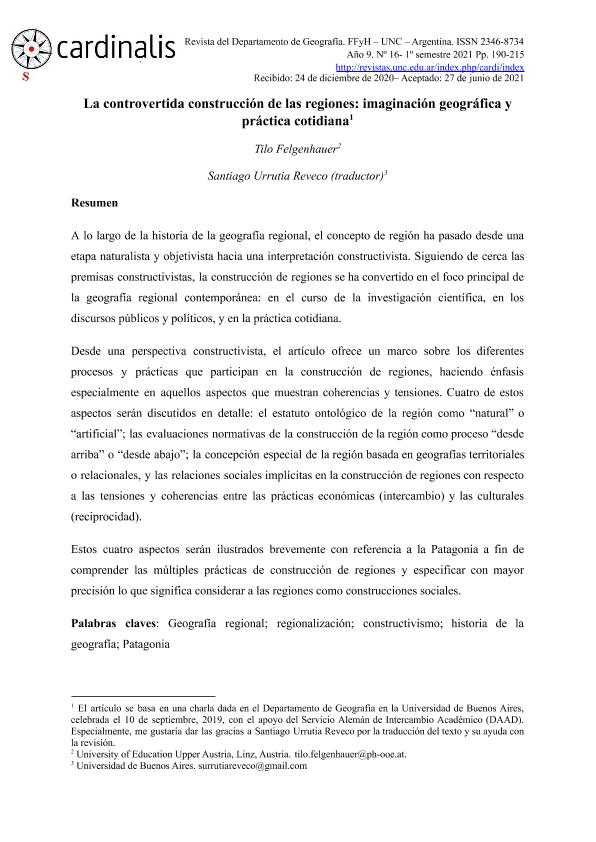Mostrar el registro sencillo del ítem
dc.contributor.author
Felgenhauer, Tilo
dc.contributor.author
Urrutia Reveco, Santiago José

dc.date.available
2022-08-17T12:58:19Z
dc.date.issued
2021-08
dc.identifier.citation
Felgenhauer, Tilo; Urrutia Reveco, Santiago José; La controvertida construcción de las regiones: Imaginación geográfica y práctica cotidiana; Universidad Nacional de Córdoba. Facultad de Filosofía y Humanidades. Departamento de Geografía; Cardinalis; 9; 16; 8-2021; 190-215
dc.identifier.issn
2346-8734
dc.identifier.uri
http://hdl.handle.net/11336/165766
dc.description.abstract
A lo largo de la historia de la geografía regional, el concepto de región ha pasado desde una etapa naturalista y objetivista hacia una interpretación constructivista. Siguiendo de cerca las premisas constructivistas, la construcción de regiones se ha convertido en el foco principal de la geografía regional contemporánea: en el curso de la investigación científica, en los discursos públicos y políticos, y en la práctica cotidiana. Desde una perspectiva constructivista, el artículo ofrece un marco sobre los diferentes procesos y prácticas que participan en la construcción de regiones, haciendo énfasis especialmente en aquellos aspectos que muestran coherencias y tensiones. Cuatro de estos aspectos serán discutidos en detalle: el estatuto ontológico de la región como “natural” o “artificial”; las evaluaciones normativas de la construcción de la región como proceso “desde arriba” o “desde abajo”; la concepción especial de la región basada en geografías territoriales o relacionales, y las relaciones sociales implícitas en la construcción de regiones con respecto a las tensiones y coherencias entre las prácticas económicas (intercambio) y las culturales (reciprocidad). Estos cuatro aspectos serán ilustrados brevemente con referencia a la Patagonia a fin de comprender las múltiples prácticas de construcción de regiones y especificar con mayor precisión lo que significa considerar a las regiones como construcciones sociales.
dc.description.abstract
In the course of the history of regional geography the concept of region has progressed from its naturalist and objectivist stage towards a constructivist meaning. Increasingly following the constructivist premises the making of regions has become the major focus of current regional geography - in the course of scientific inquiry and definition, in political and public discourses, and in everyday routine practice. From a constructivist perspective, the paper offers a framework on the different kinds of region-building processes and practices, especially focussing on the involved aspects of coherence and tension. Four of these aspects will be discussed in detail: the ontological designation of the region as either “natural” or “artificial”, normative evaluations of the region-building process as either “top-down” or “bottom-up”, the spatial conception of the region as based on either territorial or relational geographies, and the implicit social relations of region-making, in the sense of coherence and tensions between economic practices (exchange) and cultural coherence (sharing). These four aspects will be shortly illustrated with reference to the example of Patagonia in order to grasp the manifold practices of region-making and to further specify what it means to consider regions as social constructions.
dc.format
application/pdf
dc.language.iso
spa
dc.publisher
Universidad Nacional de Córdoba. Facultad de Filosofía y Humanidades. Departamento de Geografía
dc.rights
info:eu-repo/semantics/openAccess
dc.rights.uri
https://creativecommons.org/licenses/by-nc-sa/2.5/ar/
dc.subject
Geografía regional
dc.subject
Regionalización
dc.subject
Constructivismo
dc.subject
Patagonia
dc.subject.classification
Otras Geografía Económica y Social

dc.subject.classification
Geografía Económica y Social

dc.subject.classification
CIENCIAS SOCIALES

dc.title
La controvertida construcción de las regiones: Imaginación geográfica y práctica cotidiana
dc.title
The contested construction of regions: Geographical imagination and everyday practice
dc.type
info:eu-repo/semantics/article
dc.type
info:ar-repo/semantics/artículo
dc.type
info:eu-repo/semantics/publishedVersion
dc.date.updated
2022-08-16T18:05:33Z
dc.journal.volume
9
dc.journal.number
16
dc.journal.pagination
190-215
dc.journal.pais
Argentina

dc.journal.ciudad
Córdoba
dc.description.fil
Fil: Felgenhauer, Tilo. University of Education Upper Austria; Austria
dc.description.fil
Fil: Urrutia Reveco, Santiago José. Consejo Nacional de Investigaciones Científicas y Técnicas; Argentina. Universidad de Buenos Aires. Facultad de Filosofía y Letras. Instituto de Geografía "Romualdo Ardissone"; Argentina
dc.journal.title
Cardinalis
dc.relation.alternativeid
info:eu-repo/semantics/altIdentifier/url/https://revistas.unc.edu.ar/index.php/cardi/article/view/34346
Archivos asociados
